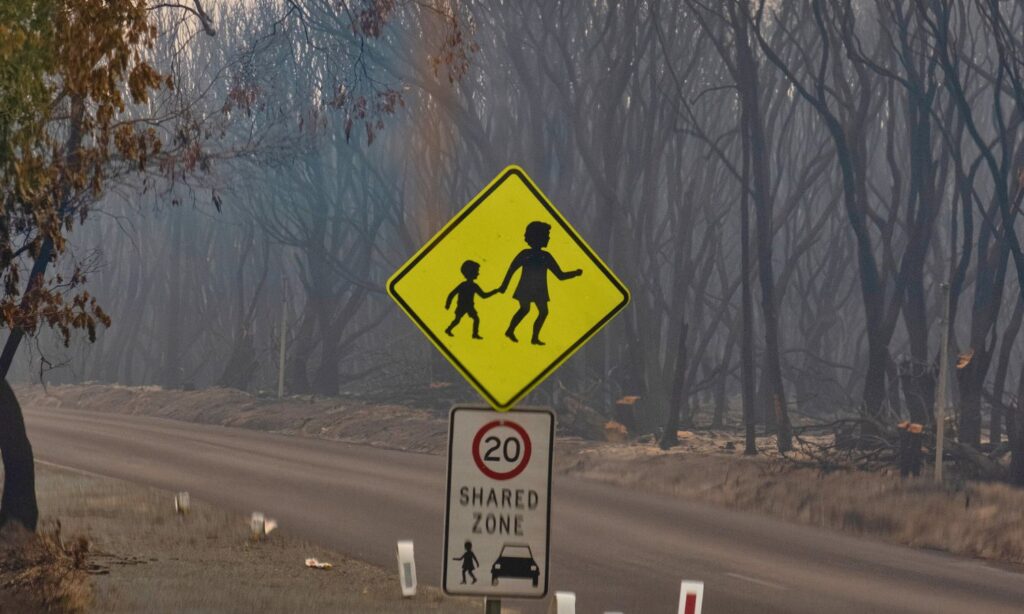That politicians should be accountable to the people that vote them into power is one of the fundamental tenets of democracy. Whether they should have to care about the impact of their decisions on those people is not.
But that could all change if a new Bill, proposed by Independent Senator David Pocock, is passed.
On Tuesday, Pocock will introduce the Climate Change Amendment (Duty of Care and Intergenerational Equity) Bill 2023. It would legislate a positive duty of care, creating a requirement for politicians and policymakers to consider the impact of climate harm on young people and future generations.
“It’s our duty as politicians and policymakers to make sure that the climate young people inherit is one they can live and thrive in,” Pocock said in a statement.
“We should be thinking about young people when we make decisions. I want to be part of a parliament, and more importantly, a country, that takes this responsibility seriously”.
Politicians should have a duty of care to young people. Our actions today shape the world they inherit.
Tomorrow, I will introduce my first private senator's bill – the Duty of Care Bill.
Sign up to support at https://t.co/cvTTqkT4er
— David Pocock (@DavidPocock) July 30, 2023
Duty of care policies are becoming more prevalent across the world as climate activists sue for impact on young people to be considered in environmental policymaking.
In 2015, the Conference of the Parties signed the Paris Agreement. This was the first-ever global, legally binding agreement on climate change. Signatory countries, including Australia, agreed to limit the increase of global average temperatures to 1.5 degrees and take the necessary action to ensure they don’t rise higher.
However, governments around the world have not been keeping to those targets. This is why there has been a major uptick in the number of activists suing organisations and governments for not keeping within their legal obligations when it comes to climate policy. And they’ve been winning.
A Dutch court ruled in 2015 that the Netherlands’ government has a duty of care when it comes to protecting its citizens from climate change. Dutch targets of cutting emissions by 14-17% of 1990 levels were rules illegal, given the threat of climate change, and that targets had to be increased to 25%.
Separately, the Netherlands again ruled in 2021 that Royal Dutch Shell legally had to cut its emissions by 45% by 2030.
In the same year, in Australia, the Federal Court ruled that Environment Minister Sussan Ley had a legal duty of care to protect young Australians, as well as the environment, from the impacts of climate change. That case was led by eight teenagers, including climate activist, Anjali Sharma.
However, last year, that decision was overturned on appeal. The Court found that the legal system was not the appropriate place to be making those kinds of judgements and that the Minister had little control over the harms caused by climate change. Given that Australia has not tried to incorporate international climate treaties into domestic law, there is little basis for the consideration.
As the Court ruled that it’s up to the government to make those kinds of changes, Sharma enlisted the help of Independent Senator David Pocock in addressing that.
“As a young person, I’m increasingly scared about my future,” Sharma said.
“The past few years have seen climate disasters and temperatures that have broken records. The government can either act in accordance with its duty to young people and deliver us a safe and liveable future, or set us on a path to climate catastrophe.”
Today, I'm backed by my senator, @DavidPocock, in launching my campaign to establish a duty of care owed by politicians to young people, ensuring that our health and wellbeing is considered when making decisions that could affect the climate system. pic.twitter.com/PE1urSDjeq
— anjali sharma (@anjsharmaaa) July 31, 2023
The bill itself would plug a gap in the legislative framework exposed by Sharma’s case. Namely, that no legislation operates on the principle that governments should care about the health and well-being of young Australians.
It seeks to amend current climate and environmental legislation, which already requires developments and decisions to consider environmental impacts, by adding two considerations. Those are to consider the impact on the well-being of young people and reject proposals if they may impact future generations.
“The focus on the short term – polls, the media cycle, the next election – need to end. We need to be looking at how our decisions impact young people and future generations,” Pocock said.
“We need a legislative tool that can be used in government decision making, and this bill will deliver that.
“I look forward to my parliamentary colleagues giving serious consideration to this legislation and hopefully supporting it and the wellbeing of young people.”
The Bill will be introduced on Tuesday and will be referred to the Senate Environment and Communications Legislation Committee for inquiry. Reporting from the inquiry will be due “early in 2024”.
Sharma and Pocock have both launched a grassroots community campaign to support the Bill, called ‘A Duty of Care‘.
Related: No Right to Protest: What Are the New Anti Protest Laws Being Used to Lock Up Climate Activists?
Related: The United Nations Is Actually Making Climate Justice a Real Thing
Read more stories from The Latch and subscribe to our email newsletter.







